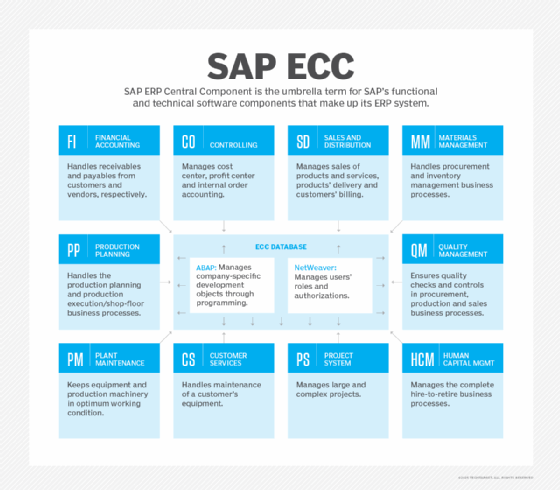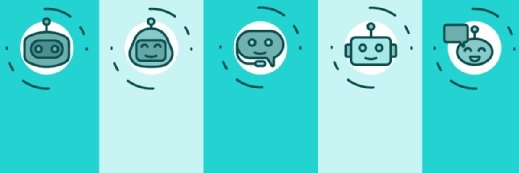What is SAP Business Suite?
SAP Business Suite is a bundle of enterprise software applications that integrate data, processes and functions for important areas such as finance, sales and human resources (HR), as well as offer industry-specific features. Business Suite is meant to help companies run their operations more efficiently, keep costs low and reveal new market opportunities.
Introduced in 2007 and updated since then, Business Suite is used primarily by medium to large enterprises.
The Business Suite bundle
The foundation of Business Suite has been SAP ERP (enterprise resource planning), often referred to as SAP ERP Central Component (SAP ECC).
ECC is typically composed of the following functional modules:
- Financial Accounting, which manages financial transactions.
- Controlling, which manages accounting and financial planning.
- Sales and Distribution, which manages major sales and distribution processes.
- Materials Management, which helps companies manage procurement and inventory.
- Production Planning, which helps businesses align supply and demand.
- Quality Management, which enables businesses to implement quality control.
- Plant Maintenance, which monitors machines and factories.
- Customer Service, which helps manage business processes for external customers.
- Project System, which helps to manage complex, large-scale projects, such as setting up a new manufacturing plant.
- Human Capital Management, which manages payroll and other functions that HR oversees.
Companies can choose to activate some or all of the above components, and the first two, finance and control, are often referred to as FICO. However, there are two mandatory technical modules of ECC that companies must implement: Advanced Business Application Programming (ABAP) and the application server platform SAP NetWeaver.

Since 2013, SAP has also offered the option to run Business Suite on HANA, the vendor's in-memory platform, which is meant to enable users to run real-time business operations and analytics. This product, which SAP encourages migration to, is sometimes referred to as Suite on HANA.
In addition to the SAP ERP foundation, Business Suite includes the following components:
- Customer Relationship Management, or CRM, which focuses on sales and marketing.
- Supplier Relationship Management, which covers procure-to-pay and collaborative service procurement.
- Product Lifecycle Management, or PLM, which helps to manage a company's product lifecycle needs.
- Supply Chain Management, which focuses on business planning, logistics and order fulfillment.
The future of Business Suite on ECC
S/4HANA -- or Business Suite 4 SAP HANA -- is written natively for HANA and is SAP's in-memory version of the Business Suite platform. It takes advantage of the SAP Fiori user experience, which is a design system that helps customers create their own applications.
The vendor intends for its customers to move to S/4HANA. Support for Business Suite on ECC is currently slated to run out in 2027.
In a February 2025 expansion, SAP introduced several new packages for Business Suite, focusing on key corporate functions and leveraging AI, including SAP's Joule generative AI tools. Among the new packages are the following:
- SAP Finance packages. These cover finance, sales and procurement processes like lead-to-cash, procure-to-pay and record-to-report applications. They are intended to utilize AI and real-time insights to provide greater efficiency in and insights into core operations and management capabilities. Capital optimization and management capabilities from SAP Taulia's solutions are included.
- SAP Supply Chain Management packages. AI-driven supply chain applications designed to integrate operational processes and supply chain functions for greater flexibility, transparency and responsiveness.
- SAP Human Capital Management Core. Packages include core HR, talent acquisition, pay for performance, and learning and career development. These are cloud-based, AI-driven solutions designed to increase agility, support workforce decisions, and better employee engagement.
- SAP Strategic Procurement packages. Integrated with SAP Ariba offerings these are intended to help manage the source-to-contract process.
- SAP Customer Experience. These cloud-based, AI-assisted solutions can help integrate sales, marketing, commerce and service in a unified platform. The tools are intended to streamline operations, personalize engagement, and optimize service delivery.
SAP Business Suite is a modular set of enterprise solutions designed to integrate core SAP applications, data and AI to help organizations unify enterprise management, drive innovation, enhance enterprise relevance and resilience, and achieve digital transformation. By integrating AI and real-time data into SAP's comprehensive business applications, SAP Business Suite helps companies to reduce business complexities while also tapping into new opportunities.
SAP Business Suite uses a software-as-a-service (SaaS) cloud-based model in most instances. Compared to on-premises deployment, the SaaS model allows for easier maintenance, faster upgrades, and smooth AI and data integration to benefit business operations more.
SAP Business Suite applications
SAP Business Suite is an end-to-end software suite. It includes applications designed to interconnect seamlessly in order to streamline and optimize multiple business functions, processes and activities.
These modular applications are intended to cover every key facet of enterprise management, including supply chain, procurement, financial management, HR/human capital management, customer experience (CX) management and IT. The applications are linked to one centralized system, and they are enhanced by AI tools and data cloud management.
SAP Business Suite is used increasingly with SAP S/4HANA Cloud Public Edition to provide an intelligent, ready-to-run cloud ERP solution for simplified enterprise management, financial reporting, risk mitigation and compliance management.
Benefits of SAP Business Suite
SAP Business Suite is designed as a set of fully integrated, modular enterprise applications that connect all business functions. In early 2025, SAP announced enhancements and new Business Suite packages intended to seamlessly integrate AI and data with core applications to help organizations streamline processes, amplify human capabilities and drive business transformation.
Today, Business Suite, collaborative AI agents and context-rich data are embedded into SAP's popular ERP and line-of-business applications. Such embedding is meant to help organizations withstand the growing complexities in the business and technology landscape -- without missing out on opportunities to innovate, grow and stay relevant.
The AI agents within SAP Business Suite work together to help organizations find fast and easy solutions to complex problems in any function.
SAP Business Suite can facilitate greater data transparency and fluid data exchange across the business. It is ideal for companies with the following characteristics:
- Handle large quantities of dense data.
- Need to connect core business operations together.
- Want to enhance integrated applications with AI tools and data cloud management.
Moreover, real-time data from any source can be integrated into SAP applications to provide useful insights that support real-time collaboration and informed decision-making throughout the organization.
The solution can be used with SAP Business Data Cloud (a separate solution) to amplify AI, insights, and processes with contextual, useful data. SAP Business Data Cloud is a SaaS data platform that unifies all SAP data and third-party data to provide the context that business leaders need to gain visibility into the organization and make better decisions.
As a cloud-based environment, SAP Business Suite offers greater flexibility and easier adaptability than on-premises systems. It also makes it easier for organizations to access the newest features and updates.
AI capabilities of SAP Business Suite
SAP Business Suite incorporates numerous AI capabilities and tools that can be tailored to any organization's specific processes and workflows. Collectively known as SAP Business AI, the multilayered system of AI tools is trained on internal data.
The two main AI tools within SAP Business Suite are the following:
Joule AI orchestrator
Joule is an AI "copilot" that enables employees to automate many mundane or repetitive tasks, thereby saving time and working more efficiently. Joule-led automations also allow teams to achieve more productive collaboration; focus on more strategic, high-impact work; and, ultimately, drive better outcomes for the organization.
Joule features a natural language interface that can accelerate workflows for many processes. Through this single interface and a persona-based copilot experience, users can complete tasks across SAP, Microsoft 365 and many other third-party systems. Integrated into everyday tools, Joule can answer questions, manage systems or deliver actionable business insights.
Joule provides context-rich insights grounded in business data that employees can access with simple natural language requests. These insights are available immediately and connect data across the business to help users enhance their understanding and make more effective decisions.
SAP Joule AI is both secure and responsible. In addition, it advances compliance and AI governance in organizations. It is designed to protect AI models from attacks and safeguard training data from unauthorized access, manipulation, or exfiltration. Further, it aligns with globally accepted ethical principles and societal values concerning AI fairness, reliability, safety, transparency, and accountability.
Joule features a network of collaborative AI agents that can automate and simplify many types of tasks. It acts as an AI agent orchestrator, deciding which agents are needed to complete a user's request and connecting agents as needed to get them to work together to complete tasks faster in a team's workflows.
Joule AI agents
SAP Joule is infused with AI agents that can automate complex workflows for multiple areas of the business, such as the following:
- Supply chain.
- Procurement.
- Finance
- HR.
- Sales.
- IT.
- Spend management.
- CX management.
Employees can use these agents to delegate multistep workflows, saving both time and resources. Joule's AI agents can also automate high-impact cross-functional workflows to help break down communication silos and tackle many kinds of situations that may not be possible to automate using preconfigured rules and logic.
These agents are backed by advanced models and are autonomous, so they can independently perform multistep functions without explicit human directions or inputs. In addition, they are collaborative, meaning they can coordinate operations across different departments as part of a multi-agent system.
SAP's AI agents can reason through information, plan courses of action, and solve complex problems more effectively. They can also self-correct errors and ask users for more information or confirmation before proceeding on a specific task.
Teams can also create and deploy custom Joule agents using Agent Builder in Joule studio. This no-code builder makes it easy to create AI agents tailored to business needs to amplify workers' expertise and business impact.
All the AI agents available with SAP Business Suite can be managed and tracked using Joule's user interface.
SAP Business Suite vs. S/4HANA vs. SAP Business Suite 7
SAP Business Suite is not a single software application. Rather, it is an end-to-end suite of specialized business applications that are provided via a SaaS cloud-based model. It also unites these applications with data and powerful AI tools to boost processing and analytics and optimize various business functions and processes.
SAP S/4HANA is an ERP software suite that runs on the SAP HANA memory database. This database offers real-time processing speeds and a simple data model. The ERP can be deployed on-premises, on a public or private cloud, and also in a hybrid deployment. It uses in-memory computing to speed processing and incorporates numerous intelligent technologies like AI, machine learning and advanced analytics.
Launched in 2006, SAP Business Suite 7 refers to a set of integrated on-premises business applications, which include the following:
- SAP ERP 6.0.
- SAP Customer Relationship Management 7.0.
- SAP Supply Chain Management 7.0.
- SAP Supplier Relationship Management 7.0 applications.
- SAP Business Suite powered by SAP HANA.
Unlike in the SAP Business Suite, all the applications within Business Suite 7 are offered on-premises. Also, Business Suite 7 does not unite AI and data with the core applications. This is another point of difference between this version and more recent ones.
SAP still provides support and mainstream maintenance for SAP Business Suite 7 and will continue to do so until 2027. The company will also provide optional extended maintenance until the end of 2030. The extended maintenance is meant for companies that need support for Business Suite 7 core applications in longer conversion phases when moving to SAP S/4HANA.
Brush up on the main functional components of SAP ECC. Learn more about different S/4HANA deployment options and how SAP is implementing AI strategies.





